WARNING: The following review contains spoilers for Jojo Rabbit. For spoiler-free thoughts on the film, head on over to our initial review here.
Taking a look at the marketing, one gets the impression that Taika Waititi’s latest film, Jojo Rabbit, is primarily about its buffoonish depiction of the Nazis. To give it some credit, this impression is not unwarranted. After all, it is a movie in which its young lead worships Nazis with such naivete. Moreover, Waititi casts himself as Adolf Hitler with the intention to transform him into the most clownish figure imaginable. In one of the film’s most humorous scenes, he exits by jumping out a window like he’s diving into a pool!
But for everyone claiming that Jojo Rabbit is the modern equivalent of 1940’s The Great Dictator, it should be noted that the film has different ambitions. Sure, it has a story that diminishes despicable people into mere fools. Characters like Captain Klenzendorf (Sam Rockwell) are more passionate about being in authority than actually exercising that authority. However, it becomes clear that Waititi is aiming for something more emotionally sincere. In short, its thematic core exposes the downsides of being innocent and negligent towards your surroundings. With the help of everyone involved, this focal point anchors a movie that handles dissonant tones with unparalleled craft.
Adapted from Christine Leunens’s 2008 novel Caging Skies, the film follows Johannes “Jojo” Betzler (Roman Griffin Davis) as he lives through a chaotic world with wide-eyed innocence. In the early scenes, Waititi’s screenplay gives us a detailed look into Jojo’s devotion to Nazi practices. For one thing, we see him running around the town doing the Nazi salute to everyone he sees. He is also part of a camp that provides all the lessons of being a good Nazi, including the supposed facts about Jewish people. If that was not enough, the imaginary friend that he uses to strike motivation and confidence is none other than Hitler himself.
For fans of Waititi’s trademark oddball humor, rest assured that his comedic sensibilities shine bright in these early sections. A lot of this is due to the script depicting the Nazis as petty and oblivious individuals. Whether that involves Fraulein Rahm (Rebel Wilson) throwing around insane rumors about Jewish people or Klenzendorf complaining about training little kids, the film makes sure to not show them with legitimate power. This extends to Waititi’s Hitler, who is genuinely hilarious as an infamous leader who is now someone who barely exists outside of Jojo’s mind. Not only does he often make boisterous expressions, but he also appears and disappears from scenes as if it were an unhinged cartoon.
With Jojo as our protagonist, we get the perspective of someone who does not know any better about the world. In fact, the only way in which he can really grow up is if tough moral dilemmas come straight to him. Fortunately, this turns out to be the case. Firstly, he has to deal with his mother Rosie (Scarlett Johansson). More often than not, she openly expresses her dislike of the war and the Nazis in general. She would rather have anything else happening in the world than a war between various nations. While she expresses tons of love to her son, their relationship is strained due to their political differences. Combine that with the fact that Jojo’s father is no longer around and you have someone that Jojo reluctantly interacts with on a regular basis.
However, the real dilemma comes when Jojo finds out that a Jewish girl named Elsa (Thomasin McKenzie) is hiding in the house. Jojo may have spent all of his time at camp thinking about what a Jewish person might be like. But his encounter with Elsa marks the first time he actually sees one. Much to his surprise, Elsa resembles an average girl instead of a demon from Hell that causes nothing but destruction. Not to mention, she proves to Jojo rather quickly that she is both a resourceful and understanding human being. As such, the two strike a friendship that starts to expose Jojo’s worldview for all of its flaws.
It is with Jojo’s oblivious outlook at the world that Waititi’s unique voice becomes extremely effective. From the various Nazi caricatures to the flowery descriptions of Jewish people, the film is stellar at filtering the unpleasantness of 1940s Germany into a child-like perspective. In the first half, rarely does it feel like Waititi wants the audience to take the onscreen events at face value. Never mind the fact that Jojo frequently asks advice from an imaginary Hitler, even a scene where he accidentally blows himself up is depicted with such goofiness. While Waititi’s own Hunt for the Wilderpeople was charming in its depiction of innocence, Jojo Rabbit is his first film that adds genuine context to that innocence. As a result, Jojo is one of the most sincere and engaging characters that Waititi has created to date.
Sincerity becomes a more prominent emotional approach as we spend more time with these characters. In a remarkably tender scene, Jojo and Rosie argue at the dinner table about the current state of the war. At first, their wildly opposing political views take center stage, as they fire off various hyperbolic claims. But as it reaches its end, they realize that they are actually angry about the father no longer being around. So to cope with that, Rosie plays a game where she acts as the father and talks to Jojo about how much he loves him. To lean more into the role, she wipes soot across her mouth, which creates a fake beard. Neither Waititi nor the actors treat this as a farce. Rather, they execute this sweet moment with full commitment and is all the better for it.
Speaking of commitment, there comes a point where the film starts focusing on more serious matters. This is not to say that the script drops the humor entirely, as certain character interactions remain light-hearted. In fact, Jojo’s close friend Yorki (Archie Yates) stays cheerful even as he goes around town carrying a missile launcher. But when it comes to the harsh reality of the war, Waititi does not hold back whatsoever. Therefore, scenes that include war violence or dangling dead bodies are shocking for both Jojo and the audience.
Without a doubt, the most tragic scene is Jojo encountering his dead mother in public. Given that this scene takes place after a group of Gestapo officers inspects the house, it is only inevitable that the woman hiding Elsa would receive punishment. But Waititi and cinematographer Mihai Malaimare Jr. frame and light the scene in ways that make it much more heart-breaking. For one, this is the first time the movie takes on a cooler and desaturated color palette. This is a huge contrast from the warm and inviting colors of the previous scenes. Furthermore, the shot composition never leaves Jojo’s viewpoint. As a result, the only things we see of Rosie are her red shoes. We don’t even get to take one last look at her face.
Rosie’s death is also important because it is the event that gets Jojo to grow out of his old habits. Prior to this scene, the movie depicts Jojo as insecure and somewhat lazy. In addition to his reliance on his imaginary friend, he still needs someone to tie his shoelaces. Now that his one parental figure is now gone, he needs to become more independent to survive. And thanks to his time with Elsa, he has become far more emotionally open than before. With all these elements, the final act reveals the film’s true identity: a superb coming-of-age story.
To further drive the idea it is a coming-of-age story, Jojo Rabbit ends in the most resolute way possible. First of all, Jojo’s final interaction with Hitler spotlights just how dumb worshipping Nazis really was. It’s not enough that Hitler appears with a massive gunshot wound, he also comes off as incredibly needy. He even begs Jojo to salute him even though the Germans had already lost the war! Hitler’s desperation is so palpable that Jojo has no choice but to kick him out of the window.
But where things really come full circle is when Jojo finally takes Elsa out of the house. It is here where Jojo performs acts of generosity to Elsa much like Rosie did to him in the earlier scenes. Most of all, Jojo ties Elsa’s shoelaces and assures her that while the world is dangerous, things will turn out okay in the end. He even takes his mother’s advice and decides to dance with Elsa out of pure happiness. With these simple gestures, Jojo manages to get rid of the toxic figure that clouded his mind. In its place is a sense of warm maturity that concludes Jojo’s arc in such a fulfilling way.
There are plenty of wartime period pieces that display its harsh events with explicit detail. But there are very few that seamlessly blend the tragic realism of war with a child-like perspective like Jojo Rabbit. Not since Steven Spielberg’s criminally overlooked Empire of the Sun has a WWII movie flourished so much because of its immature worldview. Admittedly, the film’s central message of seeing things as they are is not groundbreaking in the slightest. But once Jojo embraces his late mother’s caring personality at the end, it is almost impossible to not get swept up in the optimism. The end result is easily one of the most satisfying movies that 2019 has to offer. – Mark Tan
Rating: 9/10
Jojo Rabbit is now playing in theaters everywhere.
The film stars Roman Griffin Davis, Thomasin McKenzie, Taika Waititi, Sam Rockwell, Rebel Wilson, Stephen Merchant, and Scarlett Johansson.

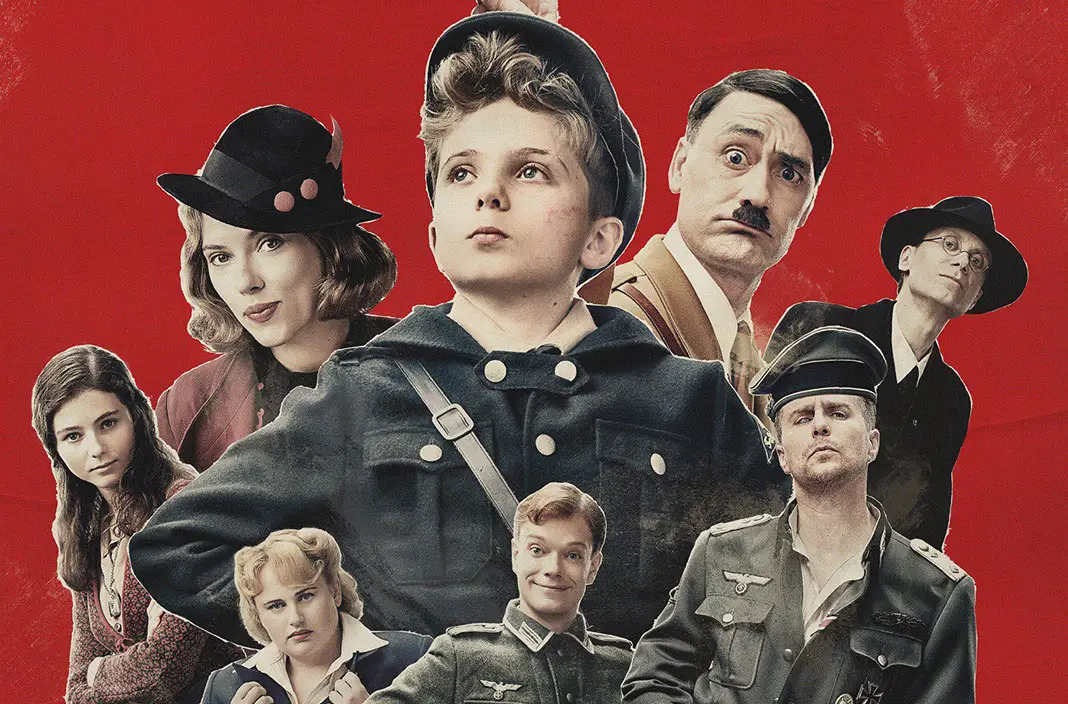
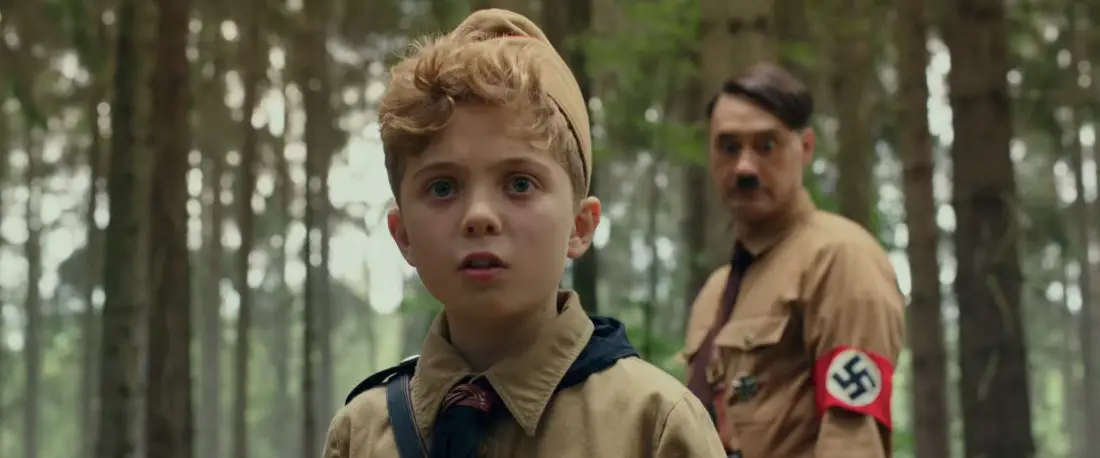
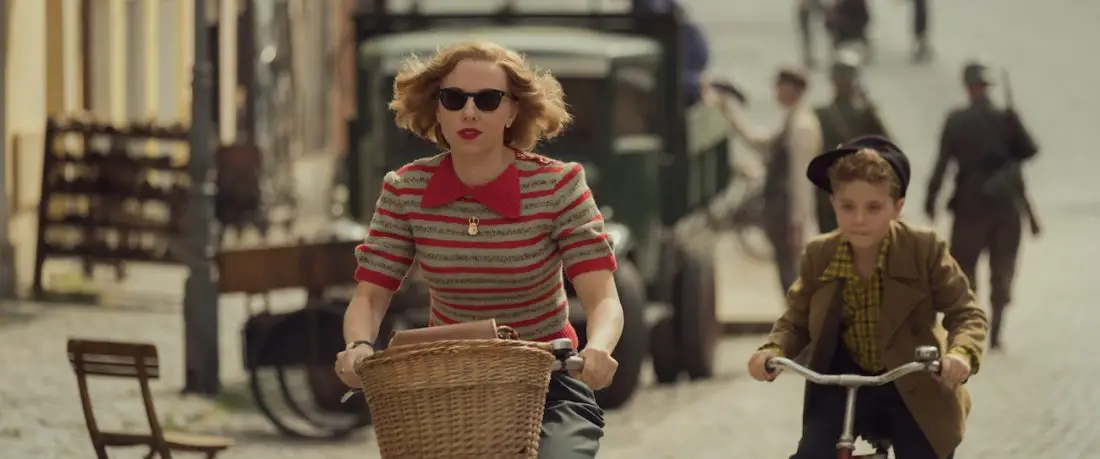


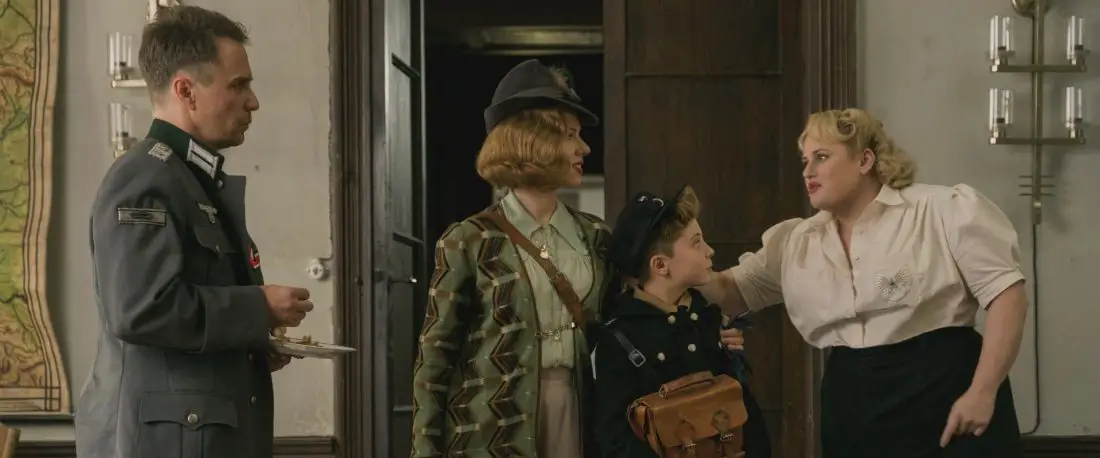
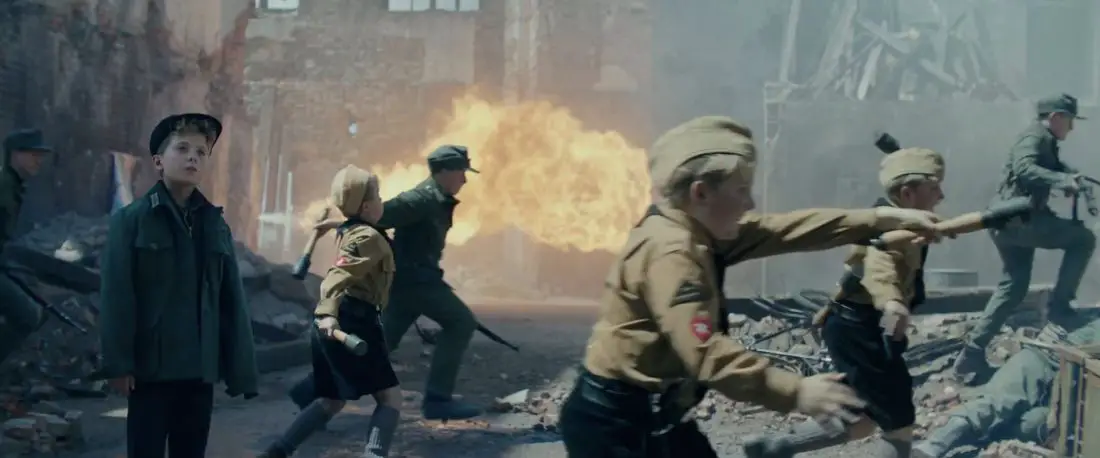
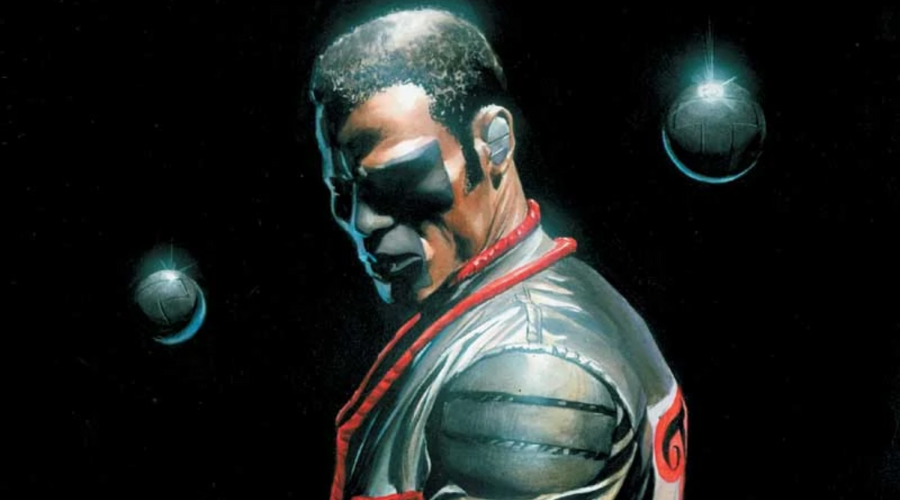
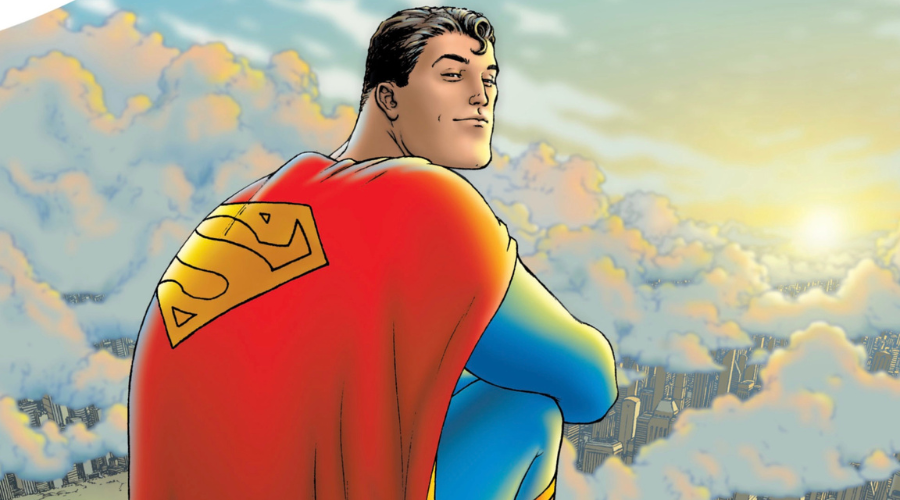
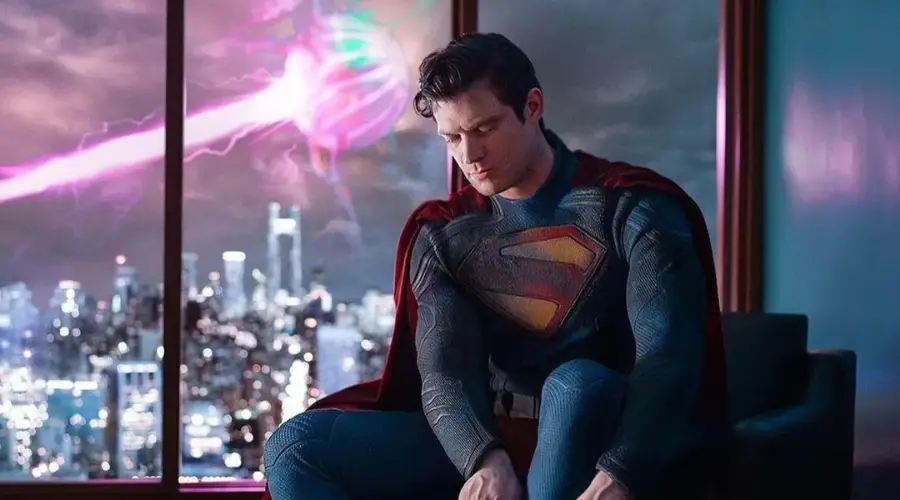
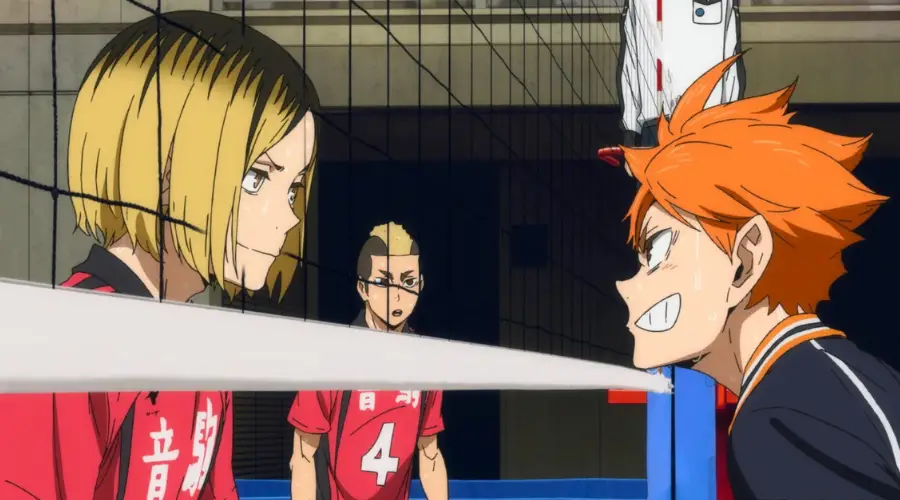

Leave a Comment